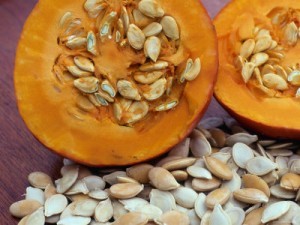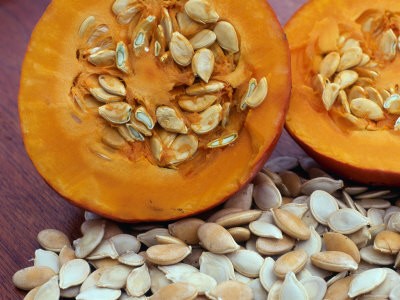
Pumpkin seeds have long been valued as a source of the mineral zinc, and the World Health Organization recommends their consumption as a good way of obtaining this nutrient. If you want to maximize the amount of zinc that you will be getting from your pumpkin seeds, we recommend that you consider purchasing them in unshelled form. Although recent studies have shown there to be little zinc in the shell itself (the shell is also called the seed coat or husk), there is a very thin layer directly beneath the shell called the endosperm envelope, and it is often pressed up very tightly against the shell. Zinc is especially concentrated in this endosperm envelope. Because it can be tricky to separate the endosperm envelope from the shell, eating the entire pumpkin seed—shell and all—will ensure that all of the zinc-containing portions of the seed will be consumed. Whole roasted, unshelled pumpkin seeds contain about 10 milligrams of zinc per 3.5 ounces, and shelled roasted pumpkin seeds (which are often referred to pumpkin seed kernels) contain about 7-8 milligrams. So even though the difference is not huge, and even though the seed kernels remain a good source of zinc, you'll be able to increase your zinc intake if you consume the unshelled version.
Searching for more delicious ways to add minerals and essential fatty acids to your culinary repertoire? Look no further than the crunchy pepita, popularly known as pumpkin seed.
This potent superfood boasts hard-to-get, essential minerals such as zinc, manganese and magnesium plus has been studied for its powerful effects against urogenital issues, heart disease and osteoporosis.
Slash your risk of cardiovascular disease with essential fats found in pumpkin seeds
I still see surprised looks when I suggest that fat is a major player in the game against cardiovascular disease. Study after study continues to show the vast benefits fats elicit on heart health.Pumpkin seeds contain linolenic acid, an important essential fat known to reduce heart attack risk. In addition, pumpkin seeds contain one of the highest levels of phytosterols among other nuts and seeds. And, these phytosterols have been shown to prevent absorption of unwanted (excessive) cholesterol in the …
Pumpkin seeds are a good source of several minerals, including iron, potassium, phosphorus, magnesium as well as zinc, a mineral that supports healthy immune function and is necessary for normal taste and smell. A 1-ounce serving of pumpkin seeds provides more than 2 milligrams of zinc, which is between 18 and 22 percent of an adult’s daily needs. In addition, these seeds supply niacin, or vitamin B3, which aids in circulation. A 1-ounce serving provides 8 and 9 percent of the daily requirement for this vitamin for men and women, respectively.
Please Read this Article at NaturalBlaze.com





Leave a Reply